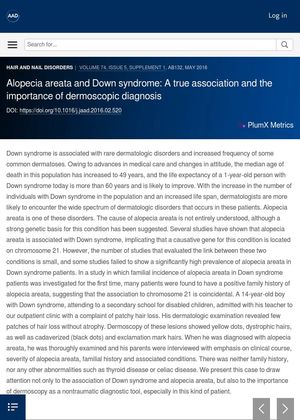Alopecia Areata and Down Syndrome: A True Association and the Importance of Dermoscopic Diagnosis
April 2016
in “
Journal of The American Academy of Dermatology
”

TLDR People with Down syndrome are more likely to experience hair loss, and using dermoscopy can help diagnose it.
The document from 7 years ago discusses the association between Down syndrome and alopecia areata, a type of hair loss. It suggests that individuals with Down syndrome, who now have a median life expectancy of over 60 years, are more likely to experience a range of dermatologic disorders, including alopecia areata. The cause of alopecia areata is not fully understood, but a strong genetic link has been proposed, with some studies indicating a gene on chromosome 21 could be responsible. However, the number of studies investigating this link is small and results have been inconsistent. The document also presents a case of a 14-year-old boy with Down syndrome and alopecia areata, highlighting the importance of dermoscopy as a non-invasive diagnostic tool. The boy had no family history of alopecia areata or other associated conditions like thyroid or celiac disease.



